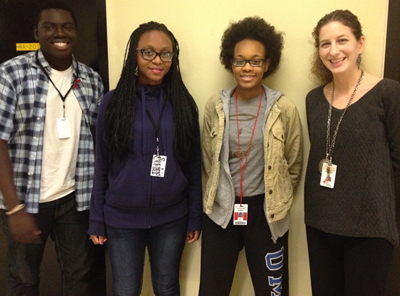
Alexandra Eugene, Kweku Quansah, and Lucia Ugbesia
English and composition teacher Oriana Packer, of Brockton High School in Brockton, Mass., assigned her junior students the IWitness Video Challenge. Here, three of them share what it was like to watch testimony for the first time.
(In the photo, left to right: Kweku Quansah, Lucia Ugbesia, Alexandra Eugene, Oriana Packer)
When did you first learn about the Holocaust?
Alexandra Eugene: When I first learned about the Holocaust, it was during the fourth grade while reading a book about a survivor’s story. Since I had read many books about the Holocaust already and watched a movie starring Kirsten Dunst, I already had a feeling of what I would be viewing on IWitness. I felt very prepared and a little excited because it was a live story and not a novel—making it more credible.
Kewku Quansah: I first learned about the Holocaust in the 7th grade when I watched the Freedom Writers movie for the first time.
Lucia Ugbesia: I first learned about the Holocaust when I was in the fifth grade, I think, or earlier.
What was the most memorable story or survivor that you watched in IWitness? What stuck out most to you?
Eugene: I heard about how the Holocaust affected the survivors’ lives afterward and how some were treated badly, worse than slaves. Helena Rosenzwieg’s testimony really popped out at me. She talked, in one of the clips, about how a beautiful Jewish boy was shot in front of her.
Quansah: The most memorable to me was the story of a man who stepped in to help during Kristallnacht. The man was just around the age of 15 or 16 at the time and him his friend were just riding on their bikes when they started to hear loud noises. They rode closer and saw the windows of a synagogue being broken and smashed by Nazi soldiers. There was a group of bystanders just watching as the Nazis ruined the building but they were silent and did nothing. The man couldn't just stand there and watch what was going on so he acted. Once the Nazis had destroyed the glass and stood back to watch what they had done he got to the ground and started picking up pieces of glass and cleaning up the area. No one else joined in they just watched and even the Nazi soldiers a bit beguiled just watched in silence.
This testimony just brought up the question within me: would I be able to have that courage? Would I do the little I could even with no one behind me to back me up?
Ugbesia: What really stuck out to me was the fact that a lot of them where maybe my age (or a little younger or older) when they first entered he concentration camps and how vivid some of their descriptions of their experiences were. I liked Helena Rosenzweig's testimony because just listening to all the things that she had to go through and witnessed in her testimony was really shocking to hear about.
Why do you think it’s important to watch testimony of genocide survivors? What can it teach us?
Eugene: I think it's important to watch testimonies of survivors of genocide because genocide is a heinous, inhuman crime that still exists today. It affects all aspects of life, and can leave negative effects on the survivors. It gives you a morsel of history that actually happened in the past, not too long ago.
Quansah: It’s important to watch testimonies because what we hear in history class and in lessons is just facts; we don't know how those people felt or the pain the endured. We just learn about them as a number but when you watch the actual testimony you better grasp what was going on and understand more. They can teach us the value of life and to cherish every day we have. It can also help us to discriminate less against those of different races and religions, because we are all equals.
Ugbesia: I think it's important because it reminds kids of the present day that they have so much to be thankful for because they could've easily been in the same situation as the survivors were. They should be especially thankful for the fact that they were born in a time period where there are more freedoms given to people and there is so much more (if not full) acceptance for people of different races and ethnicities than before. It's also important for kids to know the unaltered truth about all the things that go on and went on in history so they don't spend the rest of their lives being ignorant and end up making fools of themselves by stating false facts about historical events because all they've ever known was the sugar-coated truth.
Learning about things like the Holocaust can teach us how to better people as well. It teaches us that we shouldn't single out certain groups of people or anyone at all for discrimination because in the past, people were cruel to each other and killed and tortured each other for what we would now consider stupid and petty reasons.